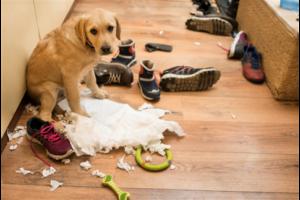The dog is a sociable animal, perhaps the most sociable of all, who therefore experiences the desire and the need to live in company.The dog who does not give in to anxiety, when his master goes out to work, has a great inner balance and was drawn up from an early age to calmly wait for his return.
What is separation anxiety?
Whoever, on the contrary, is agitated, and behaves as we will see later, is unable to face the world around him alone.The anxiety of separation is a behavioral pathology which affects, without distinction of race and size, males and females, old dogs and young people, those who live in the house and those who live in the garden.
The way the dog is high can constitute an attenuating circumstance.The puppies which have indeed always lived with their master, and on which they depend in everything and for everything, suffer the most from this disorder.Growing up, they can't stand breaking this link and constantly looking for it.A small dog who never separates from his master and who follows him like his shadow by imitating his attitude (he only eats when the man eats, he only falls asleep when the latter goes to bed, and so on), represents a limited case, but emblematic.
How to avoid this disorder?
He testifies how much the dog/man is strong and dangerous for the animal, especially if one does not get it to be independent and to have an altogether place in the house.It is important to establish rules that take into account the requirements of the master and those of his four -legged friend.

The master can very well let his dog sleep on his bed if it does not bother him, but he must be able, when he wishes, to keep him away and make him sleep in his basket.There is nothing wrong if it spends part of the day in the house, but, if a guest who does not appreciate animals or is afraid of it, he must agree to go out orLet lock up in a box without making a story.
Man must meet the dog's requirements only when he wants and if he thinks they are correct (beware, that does not allow him to mistreat him, but forces him to make use of "common sense")).Unfortunately, many owners are not of this opinion and do not live in their puppy to be alone for a long time.
Once the first months of past euphoria (during which they never separate from him), they discover that their dog can no longer do without them (anxiety of separation) and when they return after a brief absence,They find their house in a lamentable state.Boredom, tension and stress accumulated during hours of loneliness (and not only the fear of being left alone) can also be good reasons that push the dog to destroy objects within its reach.
Different manifestations of separation anxiety
Dogs, which suffer from anxiety of separation, behave in a different way: there are those who scratch the front door in the hope of joining their master, others who gnaw the furniture and the carpets, whichSalter everywhere (with a particular predilection for bed and councils) and those who destroy the shoes lying around in the house.
Some constantly bark, others howl or glaze, the most imaginative associate destructive actions with vocalizations.It is obvious that a dog who behaves thus can never become the ideal companion of a person who works all day: this is valid both for animals living in an apartment in town, for those living in a house inIn the countryside.
Indeed, if the dog has a courtyard or, even better, a garden, he can frolic freely and let off steps by digging deep holes in the meadow or under the grid of the fence.He will run like crazy along the enclosure or will set sad and inconsolable in front of the front door pending the return of his master and, if the absence continues, he will begin to moan or insistently barking.
The dog can associate certain actions that his master fulfills before leaving his absence, and manifesting excitement even before we leave him alone.Some dogs become anxious when their master changes clothes, when he takes the keys to the house or puts his coat.
In this case, they must be taught to stay quiet during the preparations which precede the departure, so that they no longer associate these gestures in the absence of their master.You have to divert your pet's attention and help it dissociate your departure from a negative event.You can allow him to have occupied toys, hide treats in the house, etc..This can take time, but gradually your dog will take care and stress will decrease.
Anxiety of separation can be solved, do not hesitate to call on your veterinarian or a behavior professional.
Cet article est-il utile, répond-il à votre problème ?







